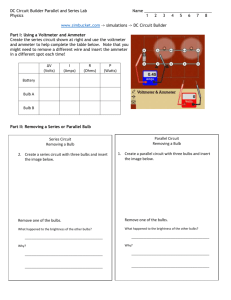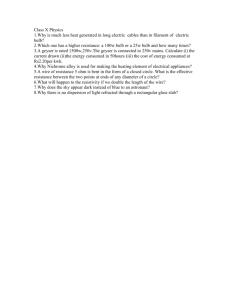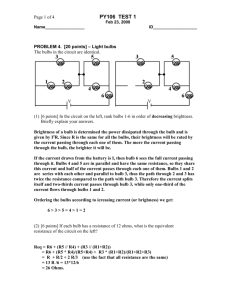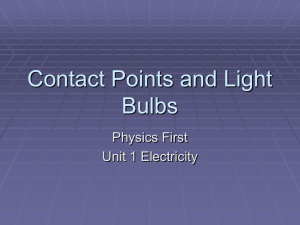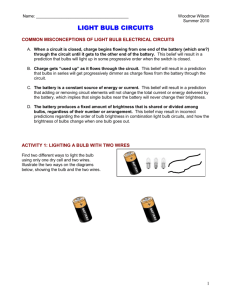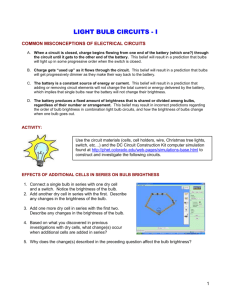CrktCTc
advertisement
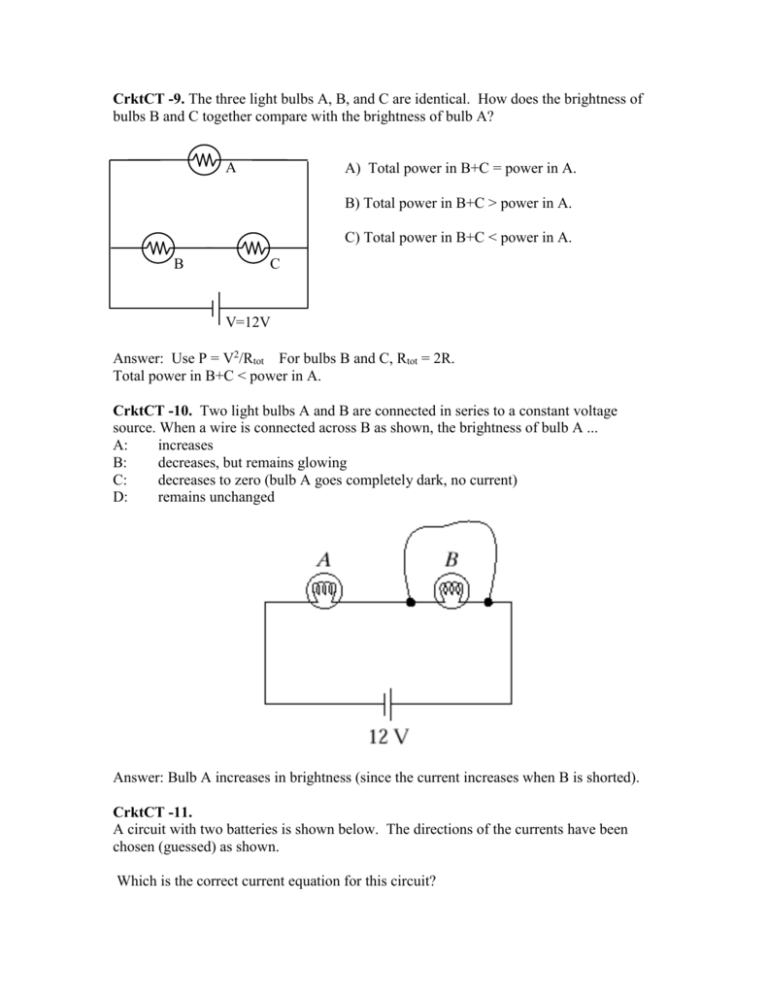
CrktCT -9. The three light bulbs A, B, and C are identical. How does the brightness of bulbs B and C together compare with the brightness of bulb A? A A) Total power in B+C = power in A. B) Total power in B+C > power in A. C) Total power in B+C < power in A. B C V=12V Answer: Use P = V2/Rtot For bulbs B and C, Rtot = 2R. Total power in B+C < power in A. CrktCT -10. Two light bulbs A and B are connected in series to a constant voltage source. When a wire is connected across B as shown, the brightness of bulb A ... A: increases B: decreases, but remains glowing C: decreases to zero (bulb A goes completely dark, no current) D: remains unchanged Answer: Bulb A increases in brightness (since the current increases when B is shorted). CrktCT -11. A circuit with two batteries is shown below. The directions of the currents have been chosen (guessed) as shown. Which is the correct current equation for this circuit? A) I2 = I1 + I3 B) I1 = I2 + I3 C) I3 = I1 + I2 D) None of these. I1 R1 V1 R2 V2 I2 Loop 1. R3 I3 Answer: I3 = I1 + I2 CrktCT -12. I1 I3 R1 V1 R2 V2 I2 Loop 1. R3 I3 Which equation below is the correct equation for Loop 1? A) –V2 + I1R1 – I2R2 = 0 B) V2 + I1R1 – I2R2 = 0 C) –V2 – I1R1 + I2R2 = 0 D) V2 + I1R1 + I2R2 = 0 E) None of these. Answer: –V2 + I1R1 – I2R2 = 0 CrktCT -13. Consider the circuit shown. If you want to measure the current thru bulb 3, how should the ammeter be attached? Pink 1 A A Yellow 2 V A Blue 3 4 A Green A) Pink B) Yellow C) Green D) Blue E) Two of the 4 positions can be used to measure bulb3’s current. Answer: B) Yellow CrktCT -14. I) In the circuit shown, what does the voltmeter read? A: B: C: D: E: 6V 3V 2V 0V Voltmeter will "fry" 6V 2 V 6V 2 A Answer: 6 V Now you switch the voltmeter over to "amp" mode. (But you leave it in the same position in the circuit) What does the ammeter read? A: B: C: D: E: 6A 3A 2A 0A Ammeter will "fry" Answer: Ammeter will fry. Ideal ammeter has zero internal resistance. If you attach an ideal ammeter to a battery, you will get infinite current. CrktCT -15. The light bulbs in the circuit are identical. When the switch is closed, A switch 12 V B 12 V A: bulb A glows, and bulb B changes brightness B: bulb A glows, and bulb B stays the same C: bulb A does not glow, and bulb B changes brightness D: bulb A does not glow, and bulb B stays the same E: Something else happens Answer: bulb A does not glow, and bulb B stays the same After the switch is closed, the voltage drop across bulb A is zero, while the voltage drop across B is 12V CrktCT -16. The light bulbs in the circuit are identical. When the switch is closed, A:both go out. B:both stay the same C:the intensity of light bulb B increases. D:the intensity of light bulb B decreases. E: both bulbs burn out due to infinite (very large) current Answer: both stay the same. CrktCT -17. All batteries shown are identical (1.5 V) B A How do the brightnesses of the bulbs compare? (Look carefully at the orientation of the batteries!) A: A is brighter B: A and B are the same brightness C: A is on, but B is brighter D: A is off, so B is brighter E: Both bulbs are off Answer: A and B are the same brightness, since both have the same voltage across them. In A, two of the three battery voltages cancel. + 0+ + - + - CrktCT -18. In the circuit shown, the two bulbs are identical. The switch is suddenly closed. What happens to the currents through points A and B? A: B: C: D: E: IA stays same, IA increases, IA stays same, IA increases, IA decreases, IB decreases IB stays the same IB stays the same IB decreases IB decreases IA A Answer: IA increases, IB stays the same B IB switch
